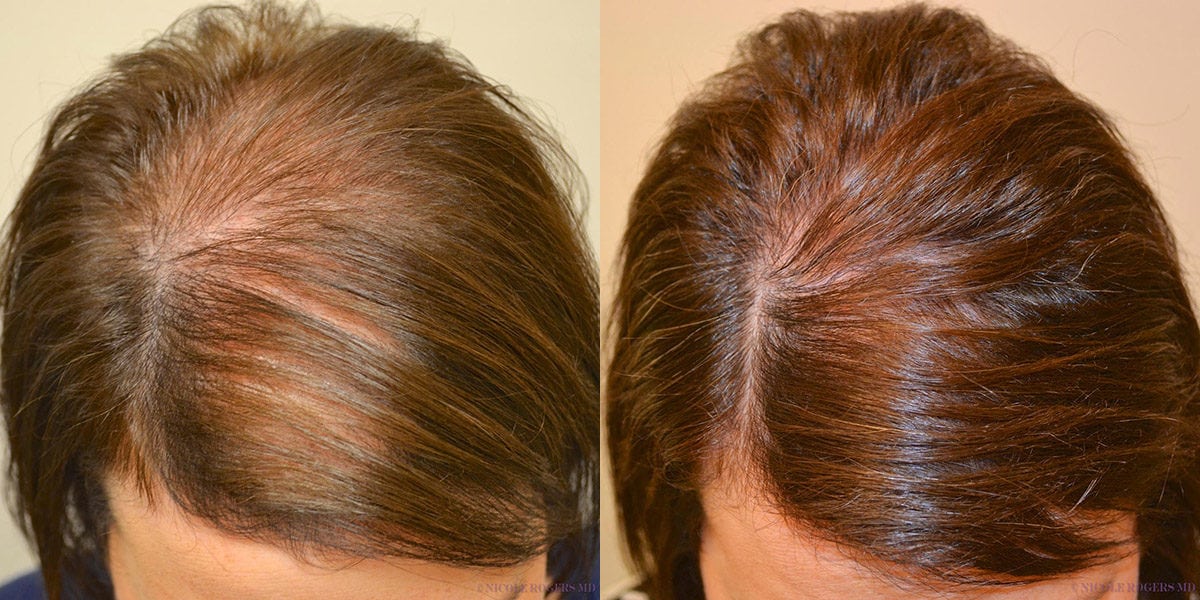
Many people with hair loss are considering using spironolactone. They hope it will help. Spironolactone is not known to be a cause of hair loss, and in fact, it may not lead to hair shedding. In this article, we comprehensively explain the relationship between spironolactone and hair loss. Keep reading to discover aspects you may not be aware of.
WHAT IS SPIRONOLACTONE?
Spironolactone is used to treat PCOS. It is also used to treat various conditions, such as hypertension, heart failure, kidney disease, and liver disease. It works as a diuretic, helping the body get rid of extra water. Spironolactone is effective for the health issues mentioned. It’s also used to treat female pattern baldness. It is an anti-androgen. It helps manage androgenetic alopecia in women. This condition is often linked to either excessive production or heightened sensitivity to male sex hormones in the female body.
HOW DOES SPIRONOLACTONE TREAT HAIR LOSS?
Spironolactone primarily acts as a diuretic, promoting the elimination of excess water and sodium from the body. In addition to its diuretic effects, it functions as an anti-androgen by blocking the actions of male sex hormones known as androgens. Spironolactone has a dual mechanism of action. It achieves this by inhibiting androgen receptors and reducing androgen production in the body. Spironolactone has a dual mechanism of action. This makes it effective in addressing conditions related to androgen excess or sensitivity. Such conditions include hirsutism and female pattern baldness. Spironolactone can slow hair loss linked to androgenic alopecia. It does this by blocking androgen production, including testosterone. It might also encourage hair regrowth.
DOES SPIRONOLACTONE CAUSE HAIR LOSS?
Spironolactone not only refrains from making hair loss worse. It also emerges as a proactive and effective solution. This is particularly true for women dealing with hereditary hair loss.Its notable efficacy extends beyond this to address hair loss associated with conditions such as polycystic ovary syndrome (PCOS). This is particularly true for women dealing with hereditary hair loss. Its notable efficacy extends beyond this to address hair loss associated with conditions such as polycystic ovary syndrome (PCOS). It also addresses hair loss linked to menopause. Women starting spironolactone treatment for hair loss can expect good results. Women starting spironolactone treatment for hair loss can expect good results. However, it’s important to be patient because noticeable improvements may take up to 6 months.
This therapeutic approach stands out as a compelling choice. It can deliver impressive results for individuals seeking effective solutions to address their concerns related to hair loss. However, it is crucial to highlight that the decision to use spironolactone should be made in consultation with a healthcare professional.They can assess individual health factors and provide personalized guidance. They can also ensure the suitability and safety of spironolactone for specific cases. This collaborative approach between patients and healthcare professionals enhances the likelihood of achieving optimal and lasting results.
WHO CAN TAKE SPIRONOLACTONE?
This collaborative approach between patients and healthcare professionals enhances the likelihood of achieving optimal and lasting results.. It has shown effectiveness, especially in those with PCOS. However, certain groups of women are advised against taking spironolactone. This includes pregnant and breastfeeding women. The FDA has assigned spironolactone a pregnancy category D rating. This rating indicates potential harm to a developing fetus. herefore, it should be approached cautiously during pregnancy or breastfeeding. Thoroughly evaluate the potential benefits against possible risks. Spironolactone is a prescription medication. The decision to use it will be made in consultation with a healthcare professional. This will be based on individual circumstances and health considerations.
HOW DOES SPIRONOLACTONE TREAT HAIR LOSS?

Spironolactone inhibits the production of androgens. Androgens are male sex hormones, such as testosterone. Reducing androgen production can impede hair loss related to androgenic alopecia. It might also stimulate hair regrowth.
In a 2015 study, 75% of women with hair loss experienced improvement with spironolactone treatment. Another study found positive outcomes with a combination of spironolactone and Minoxidil. However, immediate effects should not be expected, as it usually takes a few weeks to notice the full impact of spironolactone. Some individuals may see benefits within six months, while others may require up to a year of consistent use.
The typical initial daily dosage of spironolactone ranges from 100 to 200 milligrams. Adjustments are possible after six months if no noticeable improvements occur. It’s crucial to note that spironolactone is not effective for male pattern baldness. It is also unsuitable for female hair loss not caused by hormones, such as stress, chemotherapy, or nutritional deficiencies. Regular consultations with a healthcare provider are essential. They help monitor progress and make appropriate adjustments.
HOW MUCH IS PRESCRIBED?
For hair loss, your doctor may prescribe a daily dose ranging from 100 to 200 milligrams. However, they might start the treatment with a lower dose, around 25 milligrams a day. They would then gradually increase it to minimize potential side effects. Spironolactone is often recommended to be taken at night due to its potential to cause drowsiness. It can be taken with or without food. If you haven’t undergone menopause, your doctor may also prescribe birth control pills. They would be used in conjunction with spironolactone Additionally, regardless of age, they might recommend minoxidil as a complementary treatment. Your doctor will tailor the specific dosage and combination of medications based on the severity of your hair loss. They will also consider whether you are taking other medications for hair loss or other health conditions.
HOW LONG DOES IT TAKE TO WORK FOR HAIR LOSS?
Don’t be fooled by slow results! Spironolactone for hair loss is a slow burner, typically needing 6 months or even a year to show its full magic. But like a good friend, stick with it! After 6 months, check in with your doctor. They’ll see how things are going and maybe adjust your dose or suggest other options to keep your hair happy and healthy. Remember, patience is key to unlocking your best hair with spironolactone!
WHAT ARE THE OTHER SIDE EFFECTS OF SPIRONOLACTONE?
Spironolactone is frequently prescribed to reduce blood pressure. However, it may induce low blood pressure in individuals using it for hair loss. Regular blood pressure monitoring is crucial, especially if you do not have high blood pressure. Familiarize yourself with the process of checking your blood pressure at home.
Spironolactone can cause common side effects like drowsiness, nausea, diarrhea, headache, dizziness, irregular periods, breast tenderness, weight gain, low sex drive, depression, and fatigue. Less often, it can cause more severe side. High blood potassium is a serious and potentially life-threatening condition. Contact your doctor promptly if you experience muscle fatigue, weakness, abnormal heartbeat, nausea, or paralysis while taking spironolactone.
IS IT SAFE?
Determining the safety of spironolactone for an individual involves several factors. I cannot provide medical advice. It’s crucial to discuss your specific situation, potential risks, and benefits with your doctor. Do this before initiating or continuing any medication.
In general, spironolactone is considered safe for most healthy adults. It is used for approved purposes and under medical supervision. However, it’s important to consider factors such as medical history. Consider pregnancy and breastfeeding status.
Key considerations:
- Medical history: Some medical conditions, such as kidney disease, Addison’s disease, or severe liver disease, may make it unsafe to take spironolactone.
- Pregnancy and breastfeeding: Spironolactone can harm an unborn baby. Avoid it during pregnancy or while breastfeeding.
- Electrolyte imbalances: Regular blood tests are necessary to monitor electrolyte levels, especially potassium.
- Side effects: Common side effects include dizziness, nausea, menstrual irregularities, and breast tenderness. While less common, more serious side effects can occur. Always consult with your doctor for personalized advice based on your head.
CONCLUSION
After reading our article, you probably know the answer and the results of using spironolactone to address various types of hair loss.Like any medication, individual reactions may vary. It’s crucial to consult with a doctor to determine the safest and most suitable treatment approach based on each person’s health factors. We hope that after you use it, it will be effective and help you achieve healthier, shinier, and more lustrous hair.
FAQS
- Is spironolactone better than minoxidil for hair loss?
Spironolactone and minoxidil work differently. Spironolactone addresses hormonal factors in certain types of hair loss, while minoxidil is a topical solution that promotes hair growth. The effectiveness depends on the underlying cause of hair loss. Consult with a healthcare professional to determine the most suitable option for your specific condition.
- Does spironolactone thin body hair?
The effect of spironolactone on body hair can vary among individuals. While some may experience a reduction in body hair, others may not notice significant changes. The impact of spironolactone on body hair is often a side effect of its anti-androgenic properties, which can affect the activity of male hormones.
- In what conditions is spironolactone prescribed for hair-related issues?
Spironolactone is often prescribed for hair-related issues in conditions such as androgenetic alopecia (hereditary hair loss), polycystic ovary syndrome (PCOS), and certain hormonal imbalances.







